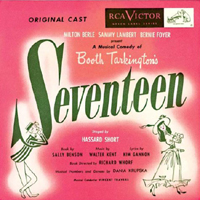 Original Broadway Cast, 1951 (RCA/Masterworks Broadway)
Original Broadway Cast, 1951 (RCA/Masterworks Broadway)  (2 / 5) “Willie, get a wiggle on!” That characteristic, gee-whiz, chorus-boy exhortation, in a song called “Weatherbee’s Drug Store,” opens the cast album of this aggressively homespun show chronicling the 1907 Hoosier romance of Willie Baxter (Kenneth Nelson) and flirty Lola Pratt (Ann Crowley). Based on a Booth Tarkington novel, and positively wallowing in the same postwar nostalgia that sired so many movie musicals of the day, Seventeen aims for charm in its score by Walter Kent and Kim Gannon. The treacle gets thick in songs like “Summertime Is Summertime” and “A Headache and a Heartache,” while the performances are often arch; get a load of the vocal preening in “This Was Just Another Day” and “Ode to Lola.” Still, there are a couple of fine show tunes here, “I Could Get Married Today” and “Reciprocity,” supported by plush Ted Royal orchestrations. And though the cast isn’t starry, the album does offer early audio peeks at The Fantasticks‘ Nelson and that distinctive Greenwillow ingenue, Ellen McCown. The recording is barely 40 minutes in length, but what’s here is a like a rich ice cream soda: very foamy and sweet, yet it still goes down easily. — Marc Miller
(2 / 5) “Willie, get a wiggle on!” That characteristic, gee-whiz, chorus-boy exhortation, in a song called “Weatherbee’s Drug Store,” opens the cast album of this aggressively homespun show chronicling the 1907 Hoosier romance of Willie Baxter (Kenneth Nelson) and flirty Lola Pratt (Ann Crowley). Based on a Booth Tarkington novel, and positively wallowing in the same postwar nostalgia that sired so many movie musicals of the day, Seventeen aims for charm in its score by Walter Kent and Kim Gannon. The treacle gets thick in songs like “Summertime Is Summertime” and “A Headache and a Heartache,” while the performances are often arch; get a load of the vocal preening in “This Was Just Another Day” and “Ode to Lola.” Still, there are a couple of fine show tunes here, “I Could Get Married Today” and “Reciprocity,” supported by plush Ted Royal orchestrations. And though the cast isn’t starry, the album does offer early audio peeks at The Fantasticks‘ Nelson and that distinctive Greenwillow ingenue, Ellen McCown. The recording is barely 40 minutes in length, but what’s here is a like a rich ice cream soda: very foamy and sweet, yet it still goes down easily. — Marc Miller
All posts by Michael Portantiere
Seussical
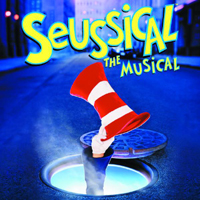 Original Broadway Cast, 2000 (Decca)
Original Broadway Cast, 2000 (Decca)  (4 / 5) Whatever was wrong with producers Barry and Fran Weissler’s attempts to cobble a musical out of bits and pieces of Dr. Seuss’ cherished children’s books, it certainly wasn’t the Stephen Flaherty-Lynn Ahrens score. Flaherty’s unfailingly tuneful melodies run the gamut of always appropriate pastiche, including soft rock, jazz, blues, salsa, folk — and, yes, a little ragtime. This composer is always good for a great ballad or two, as well; here we have the yearning, soaring “Alone in the Universe” and “Solla Sollew,” a bewitching lullaby in the “Toyland” tradition. Ahrens’ lyrics are Seussier than Seuss, for example: “If you’re hungry, there’s schlopp in the frig-e-merator!” Happily, the “life lessons” demanded of a children’s musical aren’t pounded into the ground, although “A person’s a person, no matter how small” gets more airing than may be necessary. The sound effects-heavy cast album conveys all the ingeniousness of the score but also betrays some of the misjudgment that marred the short-lived Broadway production of Seussical. Making the Cat in the Hat the evening’s emcee is sensible, but the gifted mime David Shiner isn’t the man for the job; he’s simply not a good singer, and his over-emphatic line readings sound like they come out of Saturday morning cartoons. Sharon Wilkins’ Sour Kangaroo overshoots the runway, too, with her astringent blues inflections and contrived melismas. But most of the principals are just right: Kevin Chamberlin’s sweet-souled Horton, Janine LaManna’s hapless Gertrude McFuzz, Michele Pawk’s brassy Mayzie LaBird, Anthony Blair Hall’s non-cloying JoJo. And how nice to find Broadway veteran Alice Playten in the supporting cast as the Whoville mayor’s droll wife. — Marc Miller
(4 / 5) Whatever was wrong with producers Barry and Fran Weissler’s attempts to cobble a musical out of bits and pieces of Dr. Seuss’ cherished children’s books, it certainly wasn’t the Stephen Flaherty-Lynn Ahrens score. Flaherty’s unfailingly tuneful melodies run the gamut of always appropriate pastiche, including soft rock, jazz, blues, salsa, folk — and, yes, a little ragtime. This composer is always good for a great ballad or two, as well; here we have the yearning, soaring “Alone in the Universe” and “Solla Sollew,” a bewitching lullaby in the “Toyland” tradition. Ahrens’ lyrics are Seussier than Seuss, for example: “If you’re hungry, there’s schlopp in the frig-e-merator!” Happily, the “life lessons” demanded of a children’s musical aren’t pounded into the ground, although “A person’s a person, no matter how small” gets more airing than may be necessary. The sound effects-heavy cast album conveys all the ingeniousness of the score but also betrays some of the misjudgment that marred the short-lived Broadway production of Seussical. Making the Cat in the Hat the evening’s emcee is sensible, but the gifted mime David Shiner isn’t the man for the job; he’s simply not a good singer, and his over-emphatic line readings sound like they come out of Saturday morning cartoons. Sharon Wilkins’ Sour Kangaroo overshoots the runway, too, with her astringent blues inflections and contrived melismas. But most of the principals are just right: Kevin Chamberlin’s sweet-souled Horton, Janine LaManna’s hapless Gertrude McFuzz, Michele Pawk’s brassy Mayzie LaBird, Anthony Blair Hall’s non-cloying JoJo. And how nice to find Broadway veteran Alice Playten in the supporting cast as the Whoville mayor’s droll wife. — Marc Miller
 Off-Broadway Cast, 2008 (JAY)
Off-Broadway Cast, 2008 (JAY)  (4 / 5) Seussical has had a healthy afterlife, thanks in part to some post-Broadway rewrites as represented in a popular Theatreworks/USA touring production that had a stint at the Lucille Lortel Theatre in 2008. The recording of that production doesn’t sound like an Off-Broadway cast album, possessing a full (though synth-heavy) orchestra and a large chorus. It preserves the changes Ahrens and Flaherty had made to the show, which aren’t huge; if you feel about them as I do, you’ll like the new bits and miss some of the old. The new Horton (Brian Michael Hoffman) and Gertrude McFuzz (Karen Weinberg) may not have quite as much personality as their Broadway counterparts, but they’re fine, and the Cat in the Hat (Shorey Walker) is a marked improvement. The revisions do produce a tighter, more purposeful narrative, and a vigorous celebration of all things Seuss. This remains a tuneful, imaginative score in the classic tradition. I’ll give the Broadway version a slight edge for some of the performances, but both albums are delightful. — M.M.
(4 / 5) Seussical has had a healthy afterlife, thanks in part to some post-Broadway rewrites as represented in a popular Theatreworks/USA touring production that had a stint at the Lucille Lortel Theatre in 2008. The recording of that production doesn’t sound like an Off-Broadway cast album, possessing a full (though synth-heavy) orchestra and a large chorus. It preserves the changes Ahrens and Flaherty had made to the show, which aren’t huge; if you feel about them as I do, you’ll like the new bits and miss some of the old. The new Horton (Brian Michael Hoffman) and Gertrude McFuzz (Karen Weinberg) may not have quite as much personality as their Broadway counterparts, but they’re fine, and the Cat in the Hat (Shorey Walker) is a marked improvement. The revisions do produce a tighter, more purposeful narrative, and a vigorous celebration of all things Seuss. This remains a tuneful, imaginative score in the classic tradition. I’ll give the Broadway version a slight edge for some of the performances, but both albums are delightful. — M.M.
Seesaw
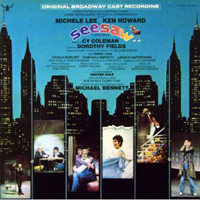 Original Broadway Cast, 1973 (Buddah/DRG)
Original Broadway Cast, 1973 (Buddah/DRG)  (3 / 5) “Up, down; up, down” goes a lyric in the title tune, and that’s a good barometer for this Cy Coleman-Dorothy Fields musical based on the William Gibson play Two for the Seesaw. First the good news: As the uptight Omaha lawyerJerry Ryan, Ken Howard sings the nicely teasing ballad “You’re a Loveable Lunatic” to his new-found girlfriend, the eccentric Gittel Mosca, played by Michele Lee. When he fully lets loose, Howard has an up-tempo gem in “We’ve Got It.” (Note the joyous Larry Fallon orchestration when Howard says, “Fred Astaire came from Omaha, y’know,” and the marvelous rideout at the end.) Gittel’s numbers aren’t as good, although “Nobody Does It Like Me” is a decent example of those self-deprecating songs that musical theater heroines sometimes sing. As for the bad material: “My City” is not inviting, and “Chapter 54, Number 1909” even less so. When show music buffs discuss the worst songs ever written for Broadway, this score’s “Ride Out the Storm” often comes up. On the other hand, “It’s Not Where You Start, It’s Where You Finish,” performed by Tommy Tune, is not only a good song but also an excellent metaphor for Seesaw, which started out shakily and righted itself only after director/show doctor Michael Bennett joined the team. — Peter Filichia
(3 / 5) “Up, down; up, down” goes a lyric in the title tune, and that’s a good barometer for this Cy Coleman-Dorothy Fields musical based on the William Gibson play Two for the Seesaw. First the good news: As the uptight Omaha lawyerJerry Ryan, Ken Howard sings the nicely teasing ballad “You’re a Loveable Lunatic” to his new-found girlfriend, the eccentric Gittel Mosca, played by Michele Lee. When he fully lets loose, Howard has an up-tempo gem in “We’ve Got It.” (Note the joyous Larry Fallon orchestration when Howard says, “Fred Astaire came from Omaha, y’know,” and the marvelous rideout at the end.) Gittel’s numbers aren’t as good, although “Nobody Does It Like Me” is a decent example of those self-deprecating songs that musical theater heroines sometimes sing. As for the bad material: “My City” is not inviting, and “Chapter 54, Number 1909” even less so. When show music buffs discuss the worst songs ever written for Broadway, this score’s “Ride Out the Storm” often comes up. On the other hand, “It’s Not Where You Start, It’s Where You Finish,” performed by Tommy Tune, is not only a good song but also an excellent metaphor for Seesaw, which started out shakily and righted itself only after director/show doctor Michael Bennett joined the team. — Peter Filichia
Secrets Every Smart Traveler Should Know
 Off-Broadway Cast, 1999 (RCA)
Off-Broadway Cast, 1999 (RCA)  (2 / 5) Many composers and lyricists turned out a mixed bag of songs and sketches for Secrets Every Smart Traveler Should Know, an occasionally clever revue. Nearly all of the numbers fall into the category of special material that’s more about the lyrics than the music. Given the show’s title, the obvious choices for song content are here — from the cute “Naked in Pittsburgh” (about lost luggage) to the round-trip finale titled (you guessed it!) “Home.” Musical supervisor-arranger Stan Freeman contributed the smart “See It Now” and the amusing running gag “This Is Your Captain Speaking.” An enjoyable detour is a clever Private Lives spoof, performed by Nick Santa Maria and Maribeth Graham. Several bits in Glen Kelly’s “The French Song,” sung by Graham and Denise Nolan, are also fun. Cabaret performers will find this recording chock full of potential comic material for their acts, but Secrets just doesn’t know when to quit, getting to the end of the road with songs about Montezuma’s revenge and traveling on “Aging Planes.” Also, the cast’s heavy-handed approach to comedy makes the ride bumpier; apparently, none of these secrets were meant to be whispered. As a result, the often-strident singing on this album becomes grating, so this is a trip that many listeners will want to take only once. — Morgan Sills
(2 / 5) Many composers and lyricists turned out a mixed bag of songs and sketches for Secrets Every Smart Traveler Should Know, an occasionally clever revue. Nearly all of the numbers fall into the category of special material that’s more about the lyrics than the music. Given the show’s title, the obvious choices for song content are here — from the cute “Naked in Pittsburgh” (about lost luggage) to the round-trip finale titled (you guessed it!) “Home.” Musical supervisor-arranger Stan Freeman contributed the smart “See It Now” and the amusing running gag “This Is Your Captain Speaking.” An enjoyable detour is a clever Private Lives spoof, performed by Nick Santa Maria and Maribeth Graham. Several bits in Glen Kelly’s “The French Song,” sung by Graham and Denise Nolan, are also fun. Cabaret performers will find this recording chock full of potential comic material for their acts, but Secrets just doesn’t know when to quit, getting to the end of the road with songs about Montezuma’s revenge and traveling on “Aging Planes.” Also, the cast’s heavy-handed approach to comedy makes the ride bumpier; apparently, none of these secrets were meant to be whispered. As a result, the often-strident singing on this album becomes grating, so this is a trip that many listeners will want to take only once. — Morgan Sills
The Secret Life of Walter Mitty
 Original Off-Broadway Cast, 1964 (Columbia/Sony)
Original Off-Broadway Cast, 1964 (Columbia/Sony)  (3 / 5) Based on a popular short story by James Thurber that had already inspired a film starring Danny Kaye, The Secret Life of Walter Mitty — adapted by librettist Joe Manchester — features a score by composer Leon Carr and lyricist Earl Shuman, who have not had a musical produced since. Despite reasonably positive reviews, the production had a short run. Yet this is a score of high quality, filled with inventive melodies and clever lyrics, and the cast is wonderfully talented. In the title role, Marc London conveys an apt nebbishy quality but springs into exuberant life when needed. He excels in “Now That I Am Forty”; “Don’t Forget,” a funny harangue duet with the big-voiced Lorraine Serabian, who plays Walter’s wife; and “Walking With Penninah,” a charm song for Walter and his daughter (Christopher Norris). As Willa de Wisp, Cathryn Damon exudes star quality in “Marriage Is for Old Folks” and in the French-chanteuse fantasy “Fan the Flame.” It’s fun to hear Rue McClanahan share the duet “Two Little Pussycats” with Lette Rehnolds, and there are entertaining numbers for the denizens of the bar where Walter hangs out — especially Eugene Roche’s “Hello, I Love You, Goodbye,” a smug lesson for Walter on how to deal with women. Then there is the first-act-ending “Confidence,” a march in which Walter makes the decision to change his life; if the tune sounds familiar, that’s probably because it’s been used as theme music for many sports telecasts. There are also some recurring themes, a few pleasant ballads, and a happy-ending finale. — Jeffrey Dunn
(3 / 5) Based on a popular short story by James Thurber that had already inspired a film starring Danny Kaye, The Secret Life of Walter Mitty — adapted by librettist Joe Manchester — features a score by composer Leon Carr and lyricist Earl Shuman, who have not had a musical produced since. Despite reasonably positive reviews, the production had a short run. Yet this is a score of high quality, filled with inventive melodies and clever lyrics, and the cast is wonderfully talented. In the title role, Marc London conveys an apt nebbishy quality but springs into exuberant life when needed. He excels in “Now That I Am Forty”; “Don’t Forget,” a funny harangue duet with the big-voiced Lorraine Serabian, who plays Walter’s wife; and “Walking With Penninah,” a charm song for Walter and his daughter (Christopher Norris). As Willa de Wisp, Cathryn Damon exudes star quality in “Marriage Is for Old Folks” and in the French-chanteuse fantasy “Fan the Flame.” It’s fun to hear Rue McClanahan share the duet “Two Little Pussycats” with Lette Rehnolds, and there are entertaining numbers for the denizens of the bar where Walter hangs out — especially Eugene Roche’s “Hello, I Love You, Goodbye,” a smug lesson for Walter on how to deal with women. Then there is the first-act-ending “Confidence,” a march in which Walter makes the decision to change his life; if the tune sounds familiar, that’s probably because it’s been used as theme music for many sports telecasts. There are also some recurring themes, a few pleasant ballads, and a happy-ending finale. — Jeffrey Dunn
The Secret Garden
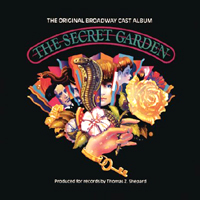 Original Broadway Cast, 1991 (Columbia)
Original Broadway Cast, 1991 (Columbia)  (5 / 5) The Lucy Simon-Marsha Norman musicalization of the beloved Frances Hodgson Burnett novel The Secret Garden worked its charm on Broadway for more than 700 performances. The writing, cast, and production were all first-rate, as is this cast album. A generous helping of dialogue on the recording helps establish the show’s story and its atmosphere. Norman’s intelligent, well-crafted lyrics (printed in the CD booklet) and Simon’s masterful score are even more rewarding with repeated listening. Mandy Patinkin, Rebecca Luker, Daisy Eagan, Robert Westenberg, John Cameron Mitchell, and Alison Fraser give well-sung performances rich with musical nuance and detailed characterization. Among the album’s highlights: Fraser has the chipper “If Had a Fine White Horse” and the closest thing in the show to an anthem, “Hold On.” Patinkin and Westenberg sing the powerful “Lily’s Eyes” to perfection. Mitchell is winning in a pair of quirky numbers, while Luker and Patinkin share the superb love duet “How Could I Ever Know?” Eagan is at the center of it all with her Tony Award-winning performance, well represented in dialogue and song on this splendid CD. — Morgan Sills
(5 / 5) The Lucy Simon-Marsha Norman musicalization of the beloved Frances Hodgson Burnett novel The Secret Garden worked its charm on Broadway for more than 700 performances. The writing, cast, and production were all first-rate, as is this cast album. A generous helping of dialogue on the recording helps establish the show’s story and its atmosphere. Norman’s intelligent, well-crafted lyrics (printed in the CD booklet) and Simon’s masterful score are even more rewarding with repeated listening. Mandy Patinkin, Rebecca Luker, Daisy Eagan, Robert Westenberg, John Cameron Mitchell, and Alison Fraser give well-sung performances rich with musical nuance and detailed characterization. Among the album’s highlights: Fraser has the chipper “If Had a Fine White Horse” and the closest thing in the show to an anthem, “Hold On.” Patinkin and Westenberg sing the powerful “Lily’s Eyes” to perfection. Mitchell is winning in a pair of quirky numbers, while Luker and Patinkin share the superb love duet “How Could I Ever Know?” Eagan is at the center of it all with her Tony Award-winning performance, well represented in dialogue and song on this splendid CD. — Morgan Sills
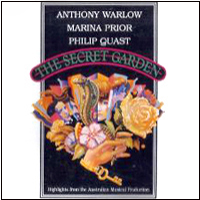 Highlights With Australian Cast, 1995 (Polydor)
Highlights With Australian Cast, 1995 (Polydor)  (2 / 5) Anthony Warlow, Marina Prior, and Philip Quast lead the cast of this recording, which consists of only eight selections from the score of The Secret Garden. The performances run the gamut from excellent to troubling. Tom Blair starts things off with a sluggish “Winter’s on the Wing.” Warlow’s “Race You to the Top of the Morning” and “Where in the World” are strong, and his “How Could I Ever Know?” with Prior is also effective. But Mary Lennox (Samantha Fiddes) is barely present here, showing up only to do her half of”Wick,” and Susan-Ann Walker doesn’t have the necessary power for “Hold On.” The orchestra, though full-sized, sounds strangely thin at times. — M.S.
(2 / 5) Anthony Warlow, Marina Prior, and Philip Quast lead the cast of this recording, which consists of only eight selections from the score of The Secret Garden. The performances run the gamut from excellent to troubling. Tom Blair starts things off with a sluggish “Winter’s on the Wing.” Warlow’s “Race You to the Top of the Morning” and “Where in the World” are strong, and his “How Could I Ever Know?” with Prior is also effective. But Mary Lennox (Samantha Fiddes) is barely present here, showing up only to do her half of”Wick,” and Susan-Ann Walker doesn’t have the necessary power for “Hold On.” The orchestra, though full-sized, sounds strangely thin at times. — M.S.
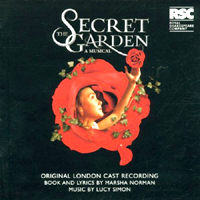 Original London Cast, 2001 (First Night)
Original London Cast, 2001 (First Night)  (4 / 5) A radically different Secret Garden is heard here, the show having undergone major rewrites for tightening and focusing purposes. The restructuring does a great job of helping to tell the story. Other bonuses include a large and lush orchestra and a goodly amount of underscored dialogue with enhancing, evocative sound effects. On the whole, the singers are less successful than those on the Broadway album in terms of musicality and characterization, but there’s one exception: the ultra-sharp performance of Linzi Hateley as Martha. In good company with her on this disc are Freddie Davies as Ben and some impressive chorus boys in the “Garden Suite.” But Craig Purnell struggles with the notes and lyrics of “Winter’s on the Wing,” Philip Quast lacks bravura, and Meredith Braun doesn’t sound quite right in “How Could I Ever Know?” — M.S.
(4 / 5) A radically different Secret Garden is heard here, the show having undergone major rewrites for tightening and focusing purposes. The restructuring does a great job of helping to tell the story. Other bonuses include a large and lush orchestra and a goodly amount of underscored dialogue with enhancing, evocative sound effects. On the whole, the singers are less successful than those on the Broadway album in terms of musicality and characterization, but there’s one exception: the ultra-sharp performance of Linzi Hateley as Martha. In good company with her on this disc are Freddie Davies as Ben and some impressive chorus boys in the “Garden Suite.” But Craig Purnell struggles with the notes and lyrics of “Winter’s on the Wing,” Philip Quast lacks bravura, and Meredith Braun doesn’t sound quite right in “How Could I Ever Know?” — M.S.
The Scarlet Pimpernel
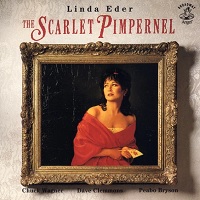 Concept Recording, 1991 (Broadway Angel)
Concept Recording, 1991 (Broadway Angel)  (2 / 5) Here’s a “concept album” for a musical that probably wasn’t a very good idea to begin with — at least, not as composed by Frank Wildhorn, whose show scores have almost all suffered from the fact that he loves to mix modern-day pop music with various other genres. As a result, few if any of his scores exhibit a cohesive style. Wildhorn tends to follow this patchwork method even in period pieces; that’s certainly the case with The Scarlet Pimpernel, which he and Nan Knighton adapted from a 1905 novel that tells a story set at the time of the French Revolution. The effect of careening from goopy pop ballads (“Home Again”) to period pastiche numbers (“Into the Fire,” “They Seek Him Here”) is exacerbated by the fact that the singers featured on this recording represent disparate stylistic worlds, from Linda Eder (Wildhorn’s muse, later his wife for a few years) to Chuck Wagner to Peabo Bryson. All of that said, one of the highlights of the album as beautifully sung by Eder is “Storybook,” a lyrical 3/4 ballad that has a wonderfully timeless feel to it. Ultimately, Pimpernel never achieved real success as a full-fledged musical, but fans of the score may wish to sample this first recording to hear how it all started. — Michael Portantiere
(2 / 5) Here’s a “concept album” for a musical that probably wasn’t a very good idea to begin with — at least, not as composed by Frank Wildhorn, whose show scores have almost all suffered from the fact that he loves to mix modern-day pop music with various other genres. As a result, few if any of his scores exhibit a cohesive style. Wildhorn tends to follow this patchwork method even in period pieces; that’s certainly the case with The Scarlet Pimpernel, which he and Nan Knighton adapted from a 1905 novel that tells a story set at the time of the French Revolution. The effect of careening from goopy pop ballads (“Home Again”) to period pastiche numbers (“Into the Fire,” “They Seek Him Here”) is exacerbated by the fact that the singers featured on this recording represent disparate stylistic worlds, from Linda Eder (Wildhorn’s muse, later his wife for a few years) to Chuck Wagner to Peabo Bryson. All of that said, one of the highlights of the album as beautifully sung by Eder is “Storybook,” a lyrical 3/4 ballad that has a wonderfully timeless feel to it. Ultimately, Pimpernel never achieved real success as a full-fledged musical, but fans of the score may wish to sample this first recording to hear how it all started. — Michael Portantiere
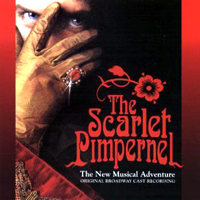 Original Broadway Cast, 1997 (Atlantic)
Original Broadway Cast, 1997 (Atlantic)  (3 / 5) Despite the antipathy leveled at this effort by composer Frank Wildhorn and lyricist Nan Knighton to adapt the Baroness Orczy’s classic novel into a lavish neo-operetta for Broadway, The Scarlet Pimpernel has its merits as heard on this recording. The score nods at current conventions but also loads up on fanciful, 18th-century atmosphere, although Wildhorn does occasionally stoop to cheap effects (he never met a key change he didn’t like). Knighton’s lyrics wouldn’t rob Sondheim of any sleep, but they’re at least competent and occasionally better; check out her genuinely witty “The Creation of Man,” which has the nerve to rhyme “haberdashery” with “make a splash, cherie.” Christine Andreas gets the best material, or maybe it’s just that her lustrous soprano makes it sound that way: a luminous “When I Look at You,” a lively “Vivez!” and a Piaf-like “Storybook.” Douglas Sills, in a high-profile debut, brings a rangy tenor and an engaging brio to the title role. As Chauvelin, Terrence Mann growls his way through some lesser, Les Miz-knockoff material. The hard-sell big finishes, needless reprises, and all those key changes can be grating, but such is the stuff of operetta. — Marc Miller
(3 / 5) Despite the antipathy leveled at this effort by composer Frank Wildhorn and lyricist Nan Knighton to adapt the Baroness Orczy’s classic novel into a lavish neo-operetta for Broadway, The Scarlet Pimpernel has its merits as heard on this recording. The score nods at current conventions but also loads up on fanciful, 18th-century atmosphere, although Wildhorn does occasionally stoop to cheap effects (he never met a key change he didn’t like). Knighton’s lyrics wouldn’t rob Sondheim of any sleep, but they’re at least competent and occasionally better; check out her genuinely witty “The Creation of Man,” which has the nerve to rhyme “haberdashery” with “make a splash, cherie.” Christine Andreas gets the best material, or maybe it’s just that her lustrous soprano makes it sound that way: a luminous “When I Look at You,” a lively “Vivez!” and a Piaf-like “Storybook.” Douglas Sills, in a high-profile debut, brings a rangy tenor and an engaging brio to the title role. As Chauvelin, Terrence Mann growls his way through some lesser, Les Miz-knockoff material. The hard-sell big finishes, needless reprises, and all those key changes can be grating, but such is the stuff of operetta. — Marc Miller
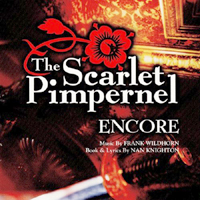 “Encore” Recording, 1999 (Atlantic)
“Encore” Recording, 1999 (Atlantic)  (2 / 5) Although it lost millions of dollars, The Scarlet Pimpernel ran for two years on Broadway, during which time its songs were rearranged, reassigned, etc. This recording, lavishly packaged in its CD edition, reflects all the revisions. The 2.0 version of the show featured not only new material but also new performers in the roles of Marguerite and Chauvelin: Rachel York and Rex Smith, the latter’s rock-star snarls and posturings amusingly out of place amid all the Louis XVI trappings. Changes to the score, all of them unabashedly populist, include a new, heavy-breathing ballad called “I’ll Forget You,” the repositioning of “Storybook” at the top of the show, and so on. Although York is a pro, she hasn’t quite the vocal finesse of Andreas, but Douglas Sills remains in fine, swashbuckling form as the hero. You may also enjoy Smith’s sneering performance, which accomplishes a high-wire feat previously considered impossible: He’s hammier than Terrence Mann! — M.M.
(2 / 5) Although it lost millions of dollars, The Scarlet Pimpernel ran for two years on Broadway, during which time its songs were rearranged, reassigned, etc. This recording, lavishly packaged in its CD edition, reflects all the revisions. The 2.0 version of the show featured not only new material but also new performers in the roles of Marguerite and Chauvelin: Rachel York and Rex Smith, the latter’s rock-star snarls and posturings amusingly out of place amid all the Louis XVI trappings. Changes to the score, all of them unabashedly populist, include a new, heavy-breathing ballad called “I’ll Forget You,” the repositioning of “Storybook” at the top of the show, and so on. Although York is a pro, she hasn’t quite the vocal finesse of Andreas, but Douglas Sills remains in fine, swashbuckling form as the hero. You may also enjoy Smith’s sneering performance, which accomplishes a high-wire feat previously considered impossible: He’s hammier than Terrence Mann! — M.M.
Say, Darling
 Original Broadway Cast, 1958 (RCA/DRG)
Original Broadway Cast, 1958 (RCA/DRG)  (2 / 5) First, novelist Richard Bissell wrote 7½ Cents, which was turned into the hit musical The Pajama Game. Then he wrote a novella about his experiences on that show, which in turn served as the basis for Say, Darling, a moderately successful “comedy about a musical.” That designation clues us in: This is not really a musical at all, just a play with some incidental songs by Jule Styne, Betty Comden, and Adolph Green. Most of the numbers are performance pieces that don’t advance the plot; some of them, such as “The Husking Bee” and “Chief of Love,” are intentionally cheesy. The two leads, Johnny Desmond and Vivian Blaine, are respectively oily and bland, although it’s interesting to hear Blaine use her contralto belt instead of her Adelaide adenoids. David Wayne, playing a small-town innocent who mixes with Broadway sharpies, has more personality than either of the stars; he puts over the unimpressive “Something’s Always Happening on the River” through sheer force of will. The title song and the waltz “Dance Only With Me” are sweet ballads, and the arrangements and orchestrations by Sid Ramin — created specifically for the recording — are supercharged. But, after a rousing Styne overture, there’s just not much going on here. — Marc Miller
(2 / 5) First, novelist Richard Bissell wrote 7½ Cents, which was turned into the hit musical The Pajama Game. Then he wrote a novella about his experiences on that show, which in turn served as the basis for Say, Darling, a moderately successful “comedy about a musical.” That designation clues us in: This is not really a musical at all, just a play with some incidental songs by Jule Styne, Betty Comden, and Adolph Green. Most of the numbers are performance pieces that don’t advance the plot; some of them, such as “The Husking Bee” and “Chief of Love,” are intentionally cheesy. The two leads, Johnny Desmond and Vivian Blaine, are respectively oily and bland, although it’s interesting to hear Blaine use her contralto belt instead of her Adelaide adenoids. David Wayne, playing a small-town innocent who mixes with Broadway sharpies, has more personality than either of the stars; he puts over the unimpressive “Something’s Always Happening on the River” through sheer force of will. The title song and the waltz “Dance Only With Me” are sweet ballads, and the arrangements and orchestrations by Sid Ramin — created specifically for the recording — are supercharged. But, after a rousing Styne overture, there’s just not much going on here. — Marc Miller
Saturday Night Fever
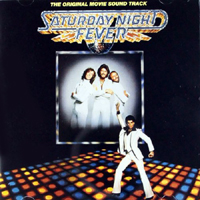 Film Soundtrack, 1977 (Polydor)
Film Soundtrack, 1977 (Polydor)  (2 / 5) Iconic though this movie may be, the blockbuster soundtrack album of Saturday Night Fever is distressingly dated. Even if individual songs are terrific, how much disco can you stand in one sitting? That’s the defining factor here. The Bee Gees deliver “Stayin’ Alive,” “Night Fever,” and “How Deep Is Your Love?” largely in falsetto, and so on and so on. In addition to two versions of “More Than a Woman,” there’s Walter Murphy’s “A Fifth of Beethoven” — a disco version of Beethoven’s Ninth Symphony — and “If I Can’t Have You,” performed by Yvonne Elliman. Also included are a few instrumental tracks written by David Shire. — Seth Christenfeld
(2 / 5) Iconic though this movie may be, the blockbuster soundtrack album of Saturday Night Fever is distressingly dated. Even if individual songs are terrific, how much disco can you stand in one sitting? That’s the defining factor here. The Bee Gees deliver “Stayin’ Alive,” “Night Fever,” and “How Deep Is Your Love?” largely in falsetto, and so on and so on. In addition to two versions of “More Than a Woman,” there’s Walter Murphy’s “A Fifth of Beethoven” — a disco version of Beethoven’s Ninth Symphony — and “If I Can’t Have You,” performed by Yvonne Elliman. Also included are a few instrumental tracks written by David Shire. — Seth Christenfeld
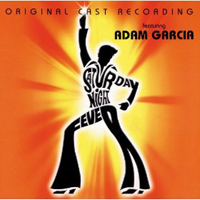 Original London Cast, 1998 (Polydor) No stars; not recommended. This recording begins with an overture that quotes “Stayin’ Alive,” and then it just gets worse. The film soundtrack has better versions of all the songs, even if it lacks the two new items that the Bee Gees wrote for the stage show: the unpleasant battle-of-the-sexes dance number “It’s My Neighborhood” and the bad ballad “Immortality.” Adam Garcia may have been charismatic as Tony Manero onstage, but on the cast album, he’s just another mediocre singer. Tara Wilkinson’s “If I Can’t Have You” is an unmemorable performance, and the efforts of the other cast members aren’t any better. The recording is mercifully brief, containing only about half of the score and none of Nan Knighton’s “book” for the musical. In this case, less is definitely more. — S.C.
Original London Cast, 1998 (Polydor) No stars; not recommended. This recording begins with an overture that quotes “Stayin’ Alive,” and then it just gets worse. The film soundtrack has better versions of all the songs, even if it lacks the two new items that the Bee Gees wrote for the stage show: the unpleasant battle-of-the-sexes dance number “It’s My Neighborhood” and the bad ballad “Immortality.” Adam Garcia may have been charismatic as Tony Manero onstage, but on the cast album, he’s just another mediocre singer. Tara Wilkinson’s “If I Can’t Have You” is an unmemorable performance, and the efforts of the other cast members aren’t any better. The recording is mercifully brief, containing only about half of the score and none of Nan Knighton’s “book” for the musical. In this case, less is definitely more. — S.C.
Saturday Night
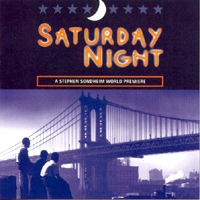 Original London Cast, 1998 (First Night)
Original London Cast, 1998 (First Night)  (1 / 5) With music and lyrics by a 24-year-old Stephen Sondheim and a book by Julius J. Epstein, Saturday Night was supposed to be produced on Broadway in the mid-’50s; but there were problems, and the show didn’t have its first fully staged performance until four decades later in London. So this cast album of that production is the world premiere recording, documenting the show as presented at a fringe theater. The 12 British actors struggle with American accents, and although they don’t have much to offer as vocalists, they do exhibit great energy. Sam Newman is passable as Gene, but Anna Francolini is inept as a phony Southern belle. Six musicians play orchestrations that are competent but do not fully reveal the beauty of Sondheim’s music. — Jeffrey Dunn
(1 / 5) With music and lyrics by a 24-year-old Stephen Sondheim and a book by Julius J. Epstein, Saturday Night was supposed to be produced on Broadway in the mid-’50s; but there were problems, and the show didn’t have its first fully staged performance until four decades later in London. So this cast album of that production is the world premiere recording, documenting the show as presented at a fringe theater. The 12 British actors struggle with American accents, and although they don’t have much to offer as vocalists, they do exhibit great energy. Sam Newman is passable as Gene, but Anna Francolini is inept as a phony Southern belle. Six musicians play orchestrations that are competent but do not fully reveal the beauty of Sondheim’s music. — Jeffrey Dunn
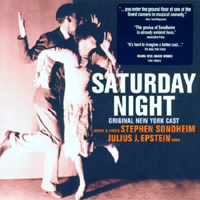 Original New York Cast, 2000 (Nonesuch)
Original New York Cast, 2000 (Nonesuch)  (5 / 5) Sondheim has described Saturday Night as his “baby pictures.” Although an anticipated move to Broadway for the 2000 Second Stage production did not happen, this lavish recording was made with 36 musicians! Jonathan Tunick’s excellent orchestrations, conducted by Steven Freeman, have the thrust of a 1950s Broadway musical, yet they sound entirely appropriate for 1929, the year in which Saturday Night is set. In the evocative, beautifully delivered title song that begins the show, four young men — played by Kirk MacDonald, Greg Zola, Joey Sorge, and Michael Benjamin Washington — lament that they are dateless on the biggest night of the week. Gene, the show’s central character, is introduced in “Class,” a complex melody perfectly sung by David Campbell. The young Australian leading man also uses his solid baritenor to excellent dramatic effect in the beautiful duet “Too Many People,” with Lauren Ward, and in the clever trio “A Moment With You,” which Campbell and Ward sing in counterpoint with a record. Ward is delightful in “Isn’t It?” and in the fine ballad, “All for You.” Other standouts are Christopher Fitzgerald in “Exhibit A,” slyly explaining to his buddies his modus operandi with women, and Andrea Burns and Clarke Thorell as a married couple cutely reminiscing about their first date in “I Remember That.” Wonderful group numbers — “Delighted, I’m Sure,” “In the Movies,” “One Wonderful Day,” and “What More Do I Need?” — fully reveal who the characters are and give all of the cast members chances to shine. — J.D.
(5 / 5) Sondheim has described Saturday Night as his “baby pictures.” Although an anticipated move to Broadway for the 2000 Second Stage production did not happen, this lavish recording was made with 36 musicians! Jonathan Tunick’s excellent orchestrations, conducted by Steven Freeman, have the thrust of a 1950s Broadway musical, yet they sound entirely appropriate for 1929, the year in which Saturday Night is set. In the evocative, beautifully delivered title song that begins the show, four young men — played by Kirk MacDonald, Greg Zola, Joey Sorge, and Michael Benjamin Washington — lament that they are dateless on the biggest night of the week. Gene, the show’s central character, is introduced in “Class,” a complex melody perfectly sung by David Campbell. The young Australian leading man also uses his solid baritenor to excellent dramatic effect in the beautiful duet “Too Many People,” with Lauren Ward, and in the clever trio “A Moment With You,” which Campbell and Ward sing in counterpoint with a record. Ward is delightful in “Isn’t It?” and in the fine ballad, “All for You.” Other standouts are Christopher Fitzgerald in “Exhibit A,” slyly explaining to his buddies his modus operandi with women, and Andrea Burns and Clarke Thorell as a married couple cutely reminiscing about their first date in “I Remember That.” Wonderful group numbers — “Delighted, I’m Sure,” “In the Movies,” “One Wonderful Day,” and “What More Do I Need?” — fully reveal who the characters are and give all of the cast members chances to shine. — J.D.
Saratoga
 Original Broadway Cast, 1959 (RCA)
Original Broadway Cast, 1959 (RCA)  (3 / 5) Edna Ferber’s Saratoga Trunk had already been adapted as a hit film, so the stage musical version, developed for Broadway as Saratoga and rumored to be the most costly production of its day, was eagerly awaited. But the show turned out to be a crushing failure. Morton da Costa was in charge of both the book and the direction; Harold Arlen and Johnny Mercer supplied the songs. Tryouts were nightmarish, and Arlen departed in disgust, leaving Mercer to compose some of the music. The recording doesn’t reflect what was reportedly an exceedingly talky script, but it does reveal the score to have many incomplete musical statements: A nice melodic line suddenly stops without resolution; a jazzy rhythm has little to play against; and nothing is at all memorable. The cast was headed by Carol Lawrence, whose soubrettish manner falls flat, and Howard Keel, who sings well but without much individuality. The humorous “Finding a Man,” given its full due by Carol Brice and Odette Myrtil, is the closest thing to a big-time musical moment. — Richard Barrios
(3 / 5) Edna Ferber’s Saratoga Trunk had already been adapted as a hit film, so the stage musical version, developed for Broadway as Saratoga and rumored to be the most costly production of its day, was eagerly awaited. But the show turned out to be a crushing failure. Morton da Costa was in charge of both the book and the direction; Harold Arlen and Johnny Mercer supplied the songs. Tryouts were nightmarish, and Arlen departed in disgust, leaving Mercer to compose some of the music. The recording doesn’t reflect what was reportedly an exceedingly talky script, but it does reveal the score to have many incomplete musical statements: A nice melodic line suddenly stops without resolution; a jazzy rhythm has little to play against; and nothing is at all memorable. The cast was headed by Carol Lawrence, whose soubrettish manner falls flat, and Howard Keel, who sings well but without much individuality. The humorous “Finding a Man,” given its full due by Carol Brice and Odette Myrtil, is the closest thing to a big-time musical moment. — Richard Barrios
Sarafina! The Music of Liberation
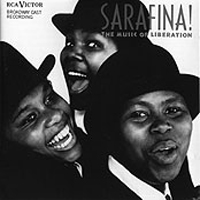 Original Cast, 1988 (RCA)
Original Cast, 1988 (RCA)  (4 / 5) Conceived and directed by Mbongeni Ngema, Sarafina! is the “little musical that could.” Despite considerable financial hardship in moving the show to production, it premiered in Johannesburg, South Africa and, within three months, was transported intact to New York for a limited engagement at Lincoln Center. It proved so popular there that it moved to Broadway, where it received five Tony Award nominations and ran for 597 performances. Sarafina! concerns apartheid and its repressive conditions as reflected in the lives of a group of high school students in Soweto during the 1980s. The title character is an endearing rebel who retains her zeal for civil rights despite harassment and incarceration. The score, by Ngema and Hugh Masekela, features the stomping dance rhythms, electronic keyboard, blasts of brass, and idiosyncratic vocal harmonies that are trademarks of Mbaqanga, the pop sound of South Africa’s black townships. The album offers exhilarating, letter-perfect performances that pulse and spin inexorably toward the climactic number, “Bring Back Nelson Mandela,” during which Sarafina (Leleti Khumalo) impersonates the then-imprisoned leader and imagines what he might say upon release. — Charles Wright
(4 / 5) Conceived and directed by Mbongeni Ngema, Sarafina! is the “little musical that could.” Despite considerable financial hardship in moving the show to production, it premiered in Johannesburg, South Africa and, within three months, was transported intact to New York for a limited engagement at Lincoln Center. It proved so popular there that it moved to Broadway, where it received five Tony Award nominations and ran for 597 performances. Sarafina! concerns apartheid and its repressive conditions as reflected in the lives of a group of high school students in Soweto during the 1980s. The title character is an endearing rebel who retains her zeal for civil rights despite harassment and incarceration. The score, by Ngema and Hugh Masekela, features the stomping dance rhythms, electronic keyboard, blasts of brass, and idiosyncratic vocal harmonies that are trademarks of Mbaqanga, the pop sound of South Africa’s black townships. The album offers exhilarating, letter-perfect performances that pulse and spin inexorably toward the climactic number, “Bring Back Nelson Mandela,” during which Sarafina (Leleti Khumalo) impersonates the then-imprisoned leader and imagines what he might say upon release. — Charles Wright
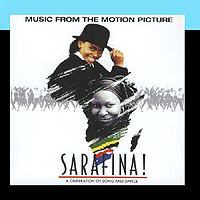 Film Soundtrack, 1992 (Next Music)
Film Soundtrack, 1992 (Next Music)  (2 / 5) The fair-to-middling film Sarafina! The Sound of Freedom, based on the exhilarating stage show Sarafina! The Music of Liberation, was released in 1992. The original musical captivated New York audiences in part because it depicted the ongoing injustice of South African apartheid and the then-current liberation movement; the film appeared a year after repeal of the apartheid laws. This soundtrack recording features various artists performing selections from the exciting musical score by Mbongeni Ngema and Hugh Masekela: Leleti Khumalo repeats her stage role of Sarafina, the irrepressible juvenile activist; the great singer and civil rights activist Miriam Makeba is her mother, who has slaved her whole life for members of the white ruling class; and Whoopi Goldberg plays Mary Masembuko, the audacious teacher who defies the state-sanctioned curriculum in order to inspire and indoctrinate Sarafina. Ngema, who conceived and directed the original stage musical, is on hand in the role of a constable but has been displaced as director by Darrel James Roodt. The musical numbers, recorded under state-of-the-art conditions, are respectably performed but lack the exuberance and emotional range that make the original-cast recording so exciting. That’s hardly surprising; whereas the Lincoln Center/Broadway recording is like a handcrafted treasure from the workshop of a natural artisan, the film soundtrack is an aural document of a commercial enterprise trying to replicate that treasure for the masses. On stage, Sarafina! was lively agitprop that contributed appreciably to global support for the South African liberation movement. The screen version, coming after repeal of apartheid, celebrated change and anticipated the election that would make Nelson Mandela the country’s first black president two years after the movie’s premier. Almost a quarter century later, the film is a memento of concerted social action that proved things can get better. Despite the compromises necessary to get this bold material to mainstream screens, including star casting and the substitution of Roodt for Ngema, this 40-minute soundtrack recording is true to the spirit and purpose reflected in the original cast album, if not equal to it in quality or energy. – C.W.
(2 / 5) The fair-to-middling film Sarafina! The Sound of Freedom, based on the exhilarating stage show Sarafina! The Music of Liberation, was released in 1992. The original musical captivated New York audiences in part because it depicted the ongoing injustice of South African apartheid and the then-current liberation movement; the film appeared a year after repeal of the apartheid laws. This soundtrack recording features various artists performing selections from the exciting musical score by Mbongeni Ngema and Hugh Masekela: Leleti Khumalo repeats her stage role of Sarafina, the irrepressible juvenile activist; the great singer and civil rights activist Miriam Makeba is her mother, who has slaved her whole life for members of the white ruling class; and Whoopi Goldberg plays Mary Masembuko, the audacious teacher who defies the state-sanctioned curriculum in order to inspire and indoctrinate Sarafina. Ngema, who conceived and directed the original stage musical, is on hand in the role of a constable but has been displaced as director by Darrel James Roodt. The musical numbers, recorded under state-of-the-art conditions, are respectably performed but lack the exuberance and emotional range that make the original-cast recording so exciting. That’s hardly surprising; whereas the Lincoln Center/Broadway recording is like a handcrafted treasure from the workshop of a natural artisan, the film soundtrack is an aural document of a commercial enterprise trying to replicate that treasure for the masses. On stage, Sarafina! was lively agitprop that contributed appreciably to global support for the South African liberation movement. The screen version, coming after repeal of apartheid, celebrated change and anticipated the election that would make Nelson Mandela the country’s first black president two years after the movie’s premier. Almost a quarter century later, the film is a memento of concerted social action that proved things can get better. Despite the compromises necessary to get this bold material to mainstream screens, including star casting and the substitution of Roodt for Ngema, this 40-minute soundtrack recording is true to the spirit and purpose reflected in the original cast album, if not equal to it in quality or energy. – C.W.
Salvation
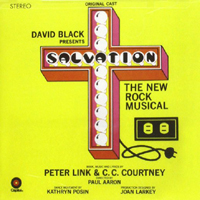 Original Off-Broadway Cast, 1969 (Capitol/Angel)
Original Off-Broadway Cast, 1969 (Capitol/Angel)  (3 / 5) Unlike some other rock musicals of the period, Salvation had no dance or spectacle elements; the physical production was tacky, and the show played in an ungainly Off-Broadway space. Yet the songs, by Peter Link and C. C. Courtney, are uncommonly sweet and melodic. The style of the music is so time-specific that, to some modern ears, it may be meaningless. Still, there’s a touching simplicity in “Let the Moment Slip By,” all about a young woman who didn’t sleep with her boyfriend and regrets it after he’s killed in Vietnam. “Daedalus” is at once an odd and ravishing tune, especially as performed by jazz singer Yolande Bavan. “In Between,” “Gina,” “Let’s Get Lost in Now,” and “If You Let Me Make Love to You, Then Why Can’t I Touch You” are arresting ’60s rock. The cast, which includes songwriters Link and Courtney along with Joe Morton, Chapman Roberts, Marta Heflin, and Annie Rachel, is vocally strong. The CD edition of the cast album includes three songs that previously had been issued only on the eight-track tape version of the recording. — David Wolf
(3 / 5) Unlike some other rock musicals of the period, Salvation had no dance or spectacle elements; the physical production was tacky, and the show played in an ungainly Off-Broadway space. Yet the songs, by Peter Link and C. C. Courtney, are uncommonly sweet and melodic. The style of the music is so time-specific that, to some modern ears, it may be meaningless. Still, there’s a touching simplicity in “Let the Moment Slip By,” all about a young woman who didn’t sleep with her boyfriend and regrets it after he’s killed in Vietnam. “Daedalus” is at once an odd and ravishing tune, especially as performed by jazz singer Yolande Bavan. “In Between,” “Gina,” “Let’s Get Lost in Now,” and “If You Let Me Make Love to You, Then Why Can’t I Touch You” are arresting ’60s rock. The cast, which includes songwriters Link and Courtney along with Joe Morton, Chapman Roberts, Marta Heflin, and Annie Rachel, is vocally strong. The CD edition of the cast album includes three songs that previously had been issued only on the eight-track tape version of the recording. — David Wolf
St. Louis Woman
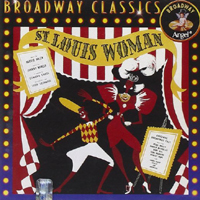 Original Broadway Cast, 1946 (Capitol/Angel)
Original Broadway Cast, 1946 (Capitol/Angel)  (4 / 5) Careening between musical comedy and musical tragedy, St. Louis Woman is a turn-of-the-century tale with an all-black cast and a score by Harold Arlen and Johnny Mercer that reflects the tonal uncertainty at both ends of the comedy/tragedy spectrum. One minute, the score strives for Porgy and Bess-like grandeur (“Leavin’ Time”), then it returns to standard-issue, albeit high-grade, Broadway (“Ridin’ on the Moon”). But Arlen’s music is amazing throughout, Mercer’s lyrics are adult and idiomatic, Leon Leonardi’s conducting is sensational, and the singers are terrific. June Hawkins infuses “I Had Myself a True Love” and “Sleep Peaceful, Mr. Used-to-Be” with operatic intensity. Ruby Hill is warm and appealing in “Lullaby” and sassy in “Anyplace I Hang My Hat Is Home.” Harold Nicholas was a great dancer without much of a voice, but he comes through in “Come Rain or Come Shine.” And a young Pearl Bailey is always in the wings, ready to deliver another insinuating comic specialty number. At just under 30 minutes, this is an uncommonly short cast album, but also an uncommonly sweet one. And the sound quality, for its age, is excellent. — Marc Miller
(4 / 5) Careening between musical comedy and musical tragedy, St. Louis Woman is a turn-of-the-century tale with an all-black cast and a score by Harold Arlen and Johnny Mercer that reflects the tonal uncertainty at both ends of the comedy/tragedy spectrum. One minute, the score strives for Porgy and Bess-like grandeur (“Leavin’ Time”), then it returns to standard-issue, albeit high-grade, Broadway (“Ridin’ on the Moon”). But Arlen’s music is amazing throughout, Mercer’s lyrics are adult and idiomatic, Leon Leonardi’s conducting is sensational, and the singers are terrific. June Hawkins infuses “I Had Myself a True Love” and “Sleep Peaceful, Mr. Used-to-Be” with operatic intensity. Ruby Hill is warm and appealing in “Lullaby” and sassy in “Anyplace I Hang My Hat Is Home.” Harold Nicholas was a great dancer without much of a voice, but he comes through in “Come Rain or Come Shine.” And a young Pearl Bailey is always in the wings, ready to deliver another insinuating comic specialty number. At just under 30 minutes, this is an uncommonly short cast album, but also an uncommonly sweet one. And the sound quality, for its age, is excellent. — Marc Miller
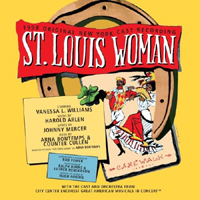 Encores! Concert Cast, 1998 (Mercury)
Encores! Concert Cast, 1998 (Mercury)  (2 / 5) This album captures every note of a City Center Encores! concert staging of St. Louis Woman on a recording that’s more than twice as long as the original. But from the first few bars — a portentous drum roll, a brassy fanfare, a showy parade of unrelated themes — it disappoints. The original orchestrations have been tarted up with Vegas obviousness, and the big songs are punctuated with even bigger “buttons” at the end. (You’d think “Come Rain or Come Shine” was the “Eroica.”) Conversely, Rob Fisher’s conducting is strangely cautious, as though applying some heat to the score might scorch it. (Listen to the middle section of “Leavin’ Time,” so deliberate that it sounds like a school band is playing it.) To be sure, it’s terrific to have all the missing material restored for a recording; “I Feel My Luck Cornin’ Down” and “Li’l Augie Is a Natural Man” are joyous rediscoveries. But this cast doesn’t make much of the score’s riches. Vanessa Williams is a pleasant vocalist, but her much-vaunted va-va-voom doesn’t carry over to disc, and she’s short on individuality in the role of Della. Helen Goldsby’s Lila is a disaster as she mumbles her lyrics and sings stiffly. Leading men Stanley Wayne Mathis and Victor Trent Cook are competent but vapid. Only Yvette Cason measures up, offering a take on Butterfly that’s very different from but equally valid as that of Pearl Bailey. — M.M.
(2 / 5) This album captures every note of a City Center Encores! concert staging of St. Louis Woman on a recording that’s more than twice as long as the original. But from the first few bars — a portentous drum roll, a brassy fanfare, a showy parade of unrelated themes — it disappoints. The original orchestrations have been tarted up with Vegas obviousness, and the big songs are punctuated with even bigger “buttons” at the end. (You’d think “Come Rain or Come Shine” was the “Eroica.”) Conversely, Rob Fisher’s conducting is strangely cautious, as though applying some heat to the score might scorch it. (Listen to the middle section of “Leavin’ Time,” so deliberate that it sounds like a school band is playing it.) To be sure, it’s terrific to have all the missing material restored for a recording; “I Feel My Luck Cornin’ Down” and “Li’l Augie Is a Natural Man” are joyous rediscoveries. But this cast doesn’t make much of the score’s riches. Vanessa Williams is a pleasant vocalist, but her much-vaunted va-va-voom doesn’t carry over to disc, and she’s short on individuality in the role of Della. Helen Goldsby’s Lila is a disaster as she mumbles her lyrics and sings stiffly. Leading men Stanley Wayne Mathis and Victor Trent Cook are competent but vapid. Only Yvette Cason measures up, offering a take on Butterfly that’s very different from but equally valid as that of Pearl Bailey. — M.M.
Sail Away
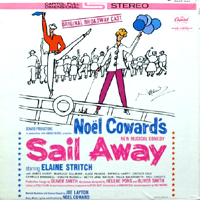 Original Broadway Cast, 1961 (Capitol/Angel)
Original Broadway Cast, 1961 (Capitol/Angel)  (4 / 5) Which musical has the best opening and closing numbers for its star? A good bet is Noël Coward’s Sail Away. The show-stopping songs, written expressly for Elaine Stritch, are “Come to Me” and “Why Do the Wrong People Travel?” Stritch is a stitch as a “professional pepper-upper” cruise director on an ocean liner, and her material is a hoot. Listen and guffaw at “Useful Phrases,” Coward’s clever parody of foreign guidebooks that give translations of sentences no one ever needs (“Please bring me some rhubarb”). Savor “The Little Ones’ A-B-C,” in which Stritch grapples with her passengers’ children. And when romance comes her way, the star is utterly convincing and tender singing “Something Very Strange.” Yes, the “Beatnik Love Affair” number, performed by Grover Dale, is an embarrassing attempt by Coward to be au courant. James Hurst is a disappointment as Stritch’s young lover — he’s supposed to be a breath of fresh air, but comes across as uptight — and Patricia Harty is simpering as the show’s soubrette. Still, Stritch keeps things happily afloat, so jump aboard for a good listen. — Peter Filichia
(4 / 5) Which musical has the best opening and closing numbers for its star? A good bet is Noël Coward’s Sail Away. The show-stopping songs, written expressly for Elaine Stritch, are “Come to Me” and “Why Do the Wrong People Travel?” Stritch is a stitch as a “professional pepper-upper” cruise director on an ocean liner, and her material is a hoot. Listen and guffaw at “Useful Phrases,” Coward’s clever parody of foreign guidebooks that give translations of sentences no one ever needs (“Please bring me some rhubarb”). Savor “The Little Ones’ A-B-C,” in which Stritch grapples with her passengers’ children. And when romance comes her way, the star is utterly convincing and tender singing “Something Very Strange.” Yes, the “Beatnik Love Affair” number, performed by Grover Dale, is an embarrassing attempt by Coward to be au courant. James Hurst is a disappointment as Stritch’s young lover — he’s supposed to be a breath of fresh air, but comes across as uptight — and Patricia Harty is simpering as the show’s soubrette. Still, Stritch keeps things happily afloat, so jump aboard for a good listen. — Peter Filichia
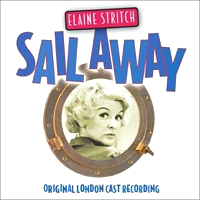 Original London Cast, 1962 (HMV/Fynsworth Alley)
Original London Cast, 1962 (HMV/Fynsworth Alley)  (3 / 5) A year after the show’s disappointing Broadway run of only a few months, Sail Away crossed over to London, where it was slightly more appreciated. Stritch was still strong at the helm, with David Holliday showing panache as her lover. One of the better songs on the original album, “The Little Ones’ A-B-C,” is missing here. But this recording does have one word more, “ass” — which, on the more demure Broadway album, was replaced by a trumpet bleat in “Why Do the Wrong People Travel.” Another addition is “Bronxville Darby and Joan,” a witty ditty for two minor characters that was cut from the New York staging, restored in London, and included here. Sadly, Irwin Kostal’s superb orchestrations have yielded to new, inferior charts by a person who is uncredited. We can understand why the culprit chose to remain anonymous. — P.F.
(3 / 5) A year after the show’s disappointing Broadway run of only a few months, Sail Away crossed over to London, where it was slightly more appreciated. Stritch was still strong at the helm, with David Holliday showing panache as her lover. One of the better songs on the original album, “The Little Ones’ A-B-C,” is missing here. But this recording does have one word more, “ass” — which, on the more demure Broadway album, was replaced by a trumpet bleat in “Why Do the Wrong People Travel.” Another addition is “Bronxville Darby and Joan,” a witty ditty for two minor characters that was cut from the New York staging, restored in London, and included here. Sadly, Irwin Kostal’s superb orchestrations have yielded to new, inferior charts by a person who is uncredited. We can understand why the culprit chose to remain anonymous. — P.F.
Ruthless!
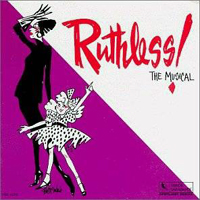 Los Angeles Cast, 1993 (Varèse Sarabande)
Los Angeles Cast, 1993 (Varèse Sarabande)  (3 / 5) Ruthless! is a very campy show, first produced Off-Broadway in 1992 and then in Los Angeles the following year, about a talented little girl named Tina Denmark (Lindsay Ridgeway), who loves to sing and dance. All of the characters in the show are women, though you can’t help wondering if some of them are being played by men. (In this cast, one of them is.) The others on hand include Tina’s mother, who most often identifies herself only as “Tina’s mother” (Joan Ryan); an aggressive talent agent named Sylvia St. Croix (Loren Freeman); Tina’s third-grade teacher, Miss Thorn (Nancy Limari), who came to New York to be an actress but was mugged before she left Penn Station; a brassy theater critic named Lita Encore (Rita McKenzie); and a few more, all of whom seem to exist only to exploit the little girl. Near the end of the first act, it seems that Tina kills someone, which we know because her mother sings: “Oh, what’s to become of my only daughter, who I have protected from croup and split ends? So many lessons that I should have taught her — like for example, to not kill her friends.” Has Tina murdered another child who got a part she wanted? That’s possible, but from the album alone, unknowable. Tina is sent away to reform school and, after that, it’s hard to understand the additional characters we meet, or anything that happens. [Ed. Note: Although the booklet accompanying the CD issue of this recording contains the lyrics to all the songs, it does not include a synopsis of the plot.] Still, Joel Paley’s lyrics are often clever and are written with real craft. The music, by veteran dance arranger, musical director and pianist Marvin Laird, is brisk. — David Wolf
(3 / 5) Ruthless! is a very campy show, first produced Off-Broadway in 1992 and then in Los Angeles the following year, about a talented little girl named Tina Denmark (Lindsay Ridgeway), who loves to sing and dance. All of the characters in the show are women, though you can’t help wondering if some of them are being played by men. (In this cast, one of them is.) The others on hand include Tina’s mother, who most often identifies herself only as “Tina’s mother” (Joan Ryan); an aggressive talent agent named Sylvia St. Croix (Loren Freeman); Tina’s third-grade teacher, Miss Thorn (Nancy Limari), who came to New York to be an actress but was mugged before she left Penn Station; a brassy theater critic named Lita Encore (Rita McKenzie); and a few more, all of whom seem to exist only to exploit the little girl. Near the end of the first act, it seems that Tina kills someone, which we know because her mother sings: “Oh, what’s to become of my only daughter, who I have protected from croup and split ends? So many lessons that I should have taught her — like for example, to not kill her friends.” Has Tina murdered another child who got a part she wanted? That’s possible, but from the album alone, unknowable. Tina is sent away to reform school and, after that, it’s hard to understand the additional characters we meet, or anything that happens. [Ed. Note: Although the booklet accompanying the CD issue of this recording contains the lyrics to all the songs, it does not include a synopsis of the plot.] Still, Joel Paley’s lyrics are often clever and are written with real craft. The music, by veteran dance arranger, musical director and pianist Marvin Laird, is brisk. — David Wolf
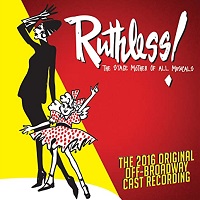 Off-Broadway Cast, 2016 (Rhino)
Off-Broadway Cast, 2016 (Rhino)  (3 / 5) Ruthless! is a fun camp-fest of a show, but as clever as the score is, it wasn’t necessarily crying out for a second recording. That said, this album of a well received Off-Broadway production is worth at least a listen or two for its overall strong cast, pretty much equal to the original in terms of quality, and fine musical direction. Here we have Tori Murray as Tina, Kim Maresca as her mom, Andrea McCullough as her teacher, and Peter Land as her agent. One disappointment: Though its nice to have the big-and-brassy voiced Rita McKenzie, who made a career with an Ethel Merman tribute show, back in the bravura role of theater critic Lita Encore, her singing voice here has quite a wobble as compared to her performance on the previous recording. Perhaps the main reason why cast album collectors might want to purchase or at least sample this one is the presence of a few bonus tracks. One of them, also included on the 1993 album, is “I’ll Be an Unkie’s Muncle,” featuring Bernadette Peters. (Laird has played piano and conducted for that beloved musical theater star since she was 13, and this recording was used in the Off-Broadway revival of Ruthless! as a song heard on the radio during a scene change.) The album is very well produced, and the booklet that comes with the CD offers several fun color photos of the production, as well as an enjoyable and informative essay about the history of the show by music journalist James Gavin — though, here again, there is no synopsis of the plot (such as it is). — Michael Portantiere
(3 / 5) Ruthless! is a fun camp-fest of a show, but as clever as the score is, it wasn’t necessarily crying out for a second recording. That said, this album of a well received Off-Broadway production is worth at least a listen or two for its overall strong cast, pretty much equal to the original in terms of quality, and fine musical direction. Here we have Tori Murray as Tina, Kim Maresca as her mom, Andrea McCullough as her teacher, and Peter Land as her agent. One disappointment: Though its nice to have the big-and-brassy voiced Rita McKenzie, who made a career with an Ethel Merman tribute show, back in the bravura role of theater critic Lita Encore, her singing voice here has quite a wobble as compared to her performance on the previous recording. Perhaps the main reason why cast album collectors might want to purchase or at least sample this one is the presence of a few bonus tracks. One of them, also included on the 1993 album, is “I’ll Be an Unkie’s Muncle,” featuring Bernadette Peters. (Laird has played piano and conducted for that beloved musical theater star since she was 13, and this recording was used in the Off-Broadway revival of Ruthless! as a song heard on the radio during a scene change.) The album is very well produced, and the booklet that comes with the CD offers several fun color photos of the production, as well as an enjoyable and informative essay about the history of the show by music journalist James Gavin — though, here again, there is no synopsis of the plot (such as it is). — Michael Portantiere
Runaways
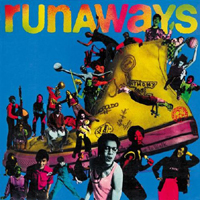 Original Broadway Cast, 1978 (Columbia/DRG)
Original Broadway Cast, 1978 (Columbia/DRG)  (3 / 5) Elizabeth Swados’s revue about street kids, developed by The Public Theater before opening on Broadway, was considered fresh and edgy when it debuted. Runaways is a collage of monologues and expressionistic songs featuring a young cast and “popular” music. Even if the occasional disco beats now sound dated, there’s lots of great stuff here; the Latin rhythms of “No Lullabies for Luis” and the tribal rap of “Enterprise” are among the best of what composer-lyricist Swados offers up. There are also some memorable melodies, as in the mesmerizing dirge “Every Now and Then” and the jaunty “Find Me a Hero.” Serious subjects like street violence and child prostitution dominate the show, but humor also abounds. Especially funny are “Revenge Song,” which has the runaways daydreaming about gruesome fates for their parents; “The Undiscovered Son,” in which they imagine their family members as celebrities; and the mocking “Where Are Those People Who Did Hair?” The entire 20-person ensemble radiates personality, passion, and intelligence; among what was then a largely unknown group are the now-familiar Trini Alvarado and Diane Lane. Karen Evans deserves a special mention for her unforgettable reading of the fiery song “To the Dead of Family Wars.” — Brooke Pierce
(3 / 5) Elizabeth Swados’s revue about street kids, developed by The Public Theater before opening on Broadway, was considered fresh and edgy when it debuted. Runaways is a collage of monologues and expressionistic songs featuring a young cast and “popular” music. Even if the occasional disco beats now sound dated, there’s lots of great stuff here; the Latin rhythms of “No Lullabies for Luis” and the tribal rap of “Enterprise” are among the best of what composer-lyricist Swados offers up. There are also some memorable melodies, as in the mesmerizing dirge “Every Now and Then” and the jaunty “Find Me a Hero.” Serious subjects like street violence and child prostitution dominate the show, but humor also abounds. Especially funny are “Revenge Song,” which has the runaways daydreaming about gruesome fates for their parents; “The Undiscovered Son,” in which they imagine their family members as celebrities; and the mocking “Where Are Those People Who Did Hair?” The entire 20-person ensemble radiates personality, passion, and intelligence; among what was then a largely unknown group are the now-familiar Trini Alvarado and Diane Lane. Karen Evans deserves a special mention for her unforgettable reading of the fiery song “To the Dead of Family Wars.” — Brooke Pierce
Rugantino
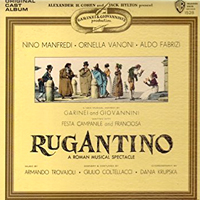 Original Broadway Cast, 1965 (Warner Bros./no CD)
Original Broadway Cast, 1965 (Warner Bros./no CD)  (3 / 5) One of the oddest musicals ever to hit Broadway, Rugantino first opened in Rome and became an enormous hit. On a visit to Italy, American producer Alexander H. Cohen became so enchanted with the show that he brought it to New York with its Italian libretto and lyrics intact. That was long before sub-or super-titles were in common use in opera houses or elsewhere, so the failure of this “Roman Musical Spectacle” on Broadway had more to do with the language barrier than with the quality of the show. The cast album was recorded in Italy, with the second leading lady replacing the original, and a different singer as the Troubadour. The souvenir program included with the LP provided an extensive synopsis, but translations of only a few songs. The librettists-lyricists are Pietro Garinei and Sandro Giovannini; the music is by Armando Trovaioli, composer of numerous Italian film scores and song hits. The score is unique; it has an unclassifiable style that will either entrance you immediately or leave you cold. On the cast album, the songs are not presented in proper sequence, so even if you read the synopsis as you listen, you may have trouble following the plot. Many musical sections of varying length and importance were not recorded, but what’s included here is performed well. As Rugantino, Nino Manfredi clearly communicates emotion through the Italian lyrics, and so do the other featured singers: Ornella Vanoni, Aldo Fabrizi, and Bice Valori. One of the traditions of a Garinei-Giovannini musical was to take a single song and have it endlessly repeated, reflecting the different characters’ points of view in the lyrics. In Rugantino, the song given such treatment is “Roma, non fa la stupida stasera,’ which was recorded by a few American singers as “The Lights of Roma” and became a standard in Italy. — Jeffrey Dunn
(3 / 5) One of the oddest musicals ever to hit Broadway, Rugantino first opened in Rome and became an enormous hit. On a visit to Italy, American producer Alexander H. Cohen became so enchanted with the show that he brought it to New York with its Italian libretto and lyrics intact. That was long before sub-or super-titles were in common use in opera houses or elsewhere, so the failure of this “Roman Musical Spectacle” on Broadway had more to do with the language barrier than with the quality of the show. The cast album was recorded in Italy, with the second leading lady replacing the original, and a different singer as the Troubadour. The souvenir program included with the LP provided an extensive synopsis, but translations of only a few songs. The librettists-lyricists are Pietro Garinei and Sandro Giovannini; the music is by Armando Trovaioli, composer of numerous Italian film scores and song hits. The score is unique; it has an unclassifiable style that will either entrance you immediately or leave you cold. On the cast album, the songs are not presented in proper sequence, so even if you read the synopsis as you listen, you may have trouble following the plot. Many musical sections of varying length and importance were not recorded, but what’s included here is performed well. As Rugantino, Nino Manfredi clearly communicates emotion through the Italian lyrics, and so do the other featured singers: Ornella Vanoni, Aldo Fabrizi, and Bice Valori. One of the traditions of a Garinei-Giovannini musical was to take a single song and have it endlessly repeated, reflecting the different characters’ points of view in the lyrics. In Rugantino, the song given such treatment is “Roma, non fa la stupida stasera,’ which was recorded by a few American singers as “The Lights of Roma” and became a standard in Italy. — Jeffrey Dunn
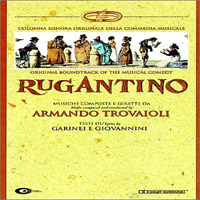 Italian Television Cast, 1978 (CAM)
Italian Television Cast, 1978 (CAM)  (3 / 5) When Rugantino was revived in Italy, it was videotaped for TV broadcast. This cast album of that production is the recording of the score that you’re most likely to find, and its lavish booklet has a few of the lyrics translated into English. This is a more complete aural document of the score than the Broadway album, with extra dance music and so on. The new Rugantino is a crooning Enrico Montesano. Bice Valori and Aldo Fabrizi repeat the roles they originated, Alida Chelli is a fetching Rosetta, and Aldo Donati is a raspy-voiced Troubadour. — J.D.
(3 / 5) When Rugantino was revived in Italy, it was videotaped for TV broadcast. This cast album of that production is the recording of the score that you’re most likely to find, and its lavish booklet has a few of the lyrics translated into English. This is a more complete aural document of the score than the Broadway album, with extra dance music and so on. The new Rugantino is a crooning Enrico Montesano. Bice Valori and Aldo Fabrizi repeat the roles they originated, Alida Chelli is a fetching Rosetta, and Aldo Donati is a raspy-voiced Troubadour. — J.D.
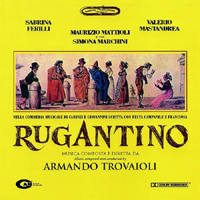 Italian Cast, 1998 (CAM)
Italian Cast, 1998 (CAM)  (4 / 5) Here is the most complete recording of Rugantino. The orchestrations are new, and the inclusion of some beautiful incidental music makes the score seem more cohesive than on the previous cast albums. Valerio Mastandrea is strong in the title role. The top-billed Sabrina Ferilli is a fiery Rosetta, while Maurizio Mattioli sings the Headsman’s songs powerfully. Fabrizio Rusotto’s Troubadour is also very effective. — J.D.
(4 / 5) Here is the most complete recording of Rugantino. The orchestrations are new, and the inclusion of some beautiful incidental music makes the score seem more cohesive than on the previous cast albums. Valerio Mastandrea is strong in the title role. The top-billed Sabrina Ferilli is a fiery Rosetta, while Maurizio Mattioli sings the Headsman’s songs powerfully. Fabrizio Rusotto’s Troubadour is also very effective. — J.D.
The Rothschilds
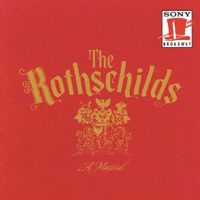 Original Broadway Cast, 1970 (Columbia/Sony)
Original Broadway Cast, 1970 (Columbia/Sony)  (5 / 5) Composer Jerry Bock and lyricist Sheldon Harnick were still at the peak of their productivity, following their great success with Fiddler on the Roof, when they wrote this sort of rich-man’s Fiddler, based on the true story of the wealthy and powerful Rothschild family. Listening to the impeccable cast album today, it’s hard to believe that The Rothschilds was not a blockbuster hit. Happily, this aural document preserves the score of a musical theater masterpiece. The songs are exciting and richly melodic, full of intelligence, character, and passion. There are outstanding, Tony Award-winning performances by Hal Linden as Mayer Rothschild and Keene Curtis in multiple roles; also excellent are Paul Hecht as Nathan Rothschild and Jill Clayburgh as Hannah Cohen. The songs “Pleasure and Privilege” and “Everything” are triumphs of ingenuity. The ballad “In My Own Lifetime,” a strong comment on the futility of war, is movingly delivered by Linden, who also does a wonderful job with the funny, clever “He Tossed a Coin.” Bock’s music is orchestrated masterfully by Don Walker. This album is a great addition to any collection. — Gerard Alessandrini
(5 / 5) Composer Jerry Bock and lyricist Sheldon Harnick were still at the peak of their productivity, following their great success with Fiddler on the Roof, when they wrote this sort of rich-man’s Fiddler, based on the true story of the wealthy and powerful Rothschild family. Listening to the impeccable cast album today, it’s hard to believe that The Rothschilds was not a blockbuster hit. Happily, this aural document preserves the score of a musical theater masterpiece. The songs are exciting and richly melodic, full of intelligence, character, and passion. There are outstanding, Tony Award-winning performances by Hal Linden as Mayer Rothschild and Keene Curtis in multiple roles; also excellent are Paul Hecht as Nathan Rothschild and Jill Clayburgh as Hannah Cohen. The songs “Pleasure and Privilege” and “Everything” are triumphs of ingenuity. The ballad “In My Own Lifetime,” a strong comment on the futility of war, is movingly delivered by Linden, who also does a wonderful job with the funny, clever “He Tossed a Coin.” Bock’s music is orchestrated masterfully by Don Walker. This album is a great addition to any collection. — Gerard Alessandrini
Romance Romance
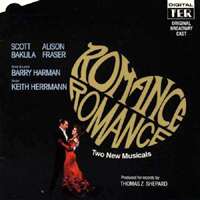 Original Broadway Cast, 1988 (MCA Classics)
Original Broadway Cast, 1988 (MCA Classics)  (2 / 5) Romance Romance is intelligent and well crafted, but the score is not one you’ll necessarily be eager to hear more than once. The show consists of two one-act musicals. In the first, a rich, bored, 19th-century Viennese man and woman masquerading as members of the bourgeoisie meet, become romantically involved, and finally reveal the truth. In the second piece, two contemporary couples sharing a house in the Hamptons ponder whether one of the couples is on the verge of adultery. The problem is an absence of defined characters: In the first act, Alfred and Pepi are just a generic man and woman, while the second-act foursome have no traits to distinguish them from one another or from anyone else. The score has careful writing by lyricist Barry Harman and composer Keith Herrmann. Their songs perform the narrative functions obediently, but we always hear a lyricist at work rather than a character portrayal being built. Cast members Scott Bakula, Alison Fraser, Robert Hoshout, and Deborah Graham all sing well, which does help. — David Wolf
(2 / 5) Romance Romance is intelligent and well crafted, but the score is not one you’ll necessarily be eager to hear more than once. The show consists of two one-act musicals. In the first, a rich, bored, 19th-century Viennese man and woman masquerading as members of the bourgeoisie meet, become romantically involved, and finally reveal the truth. In the second piece, two contemporary couples sharing a house in the Hamptons ponder whether one of the couples is on the verge of adultery. The problem is an absence of defined characters: In the first act, Alfred and Pepi are just a generic man and woman, while the second-act foursome have no traits to distinguish them from one another or from anyone else. The score has careful writing by lyricist Barry Harman and composer Keith Herrmann. Their songs perform the narrative functions obediently, but we always hear a lyricist at work rather than a character portrayal being built. Cast members Scott Bakula, Alison Fraser, Robert Hoshout, and Deborah Graham all sing well, which does help. — David Wolf

